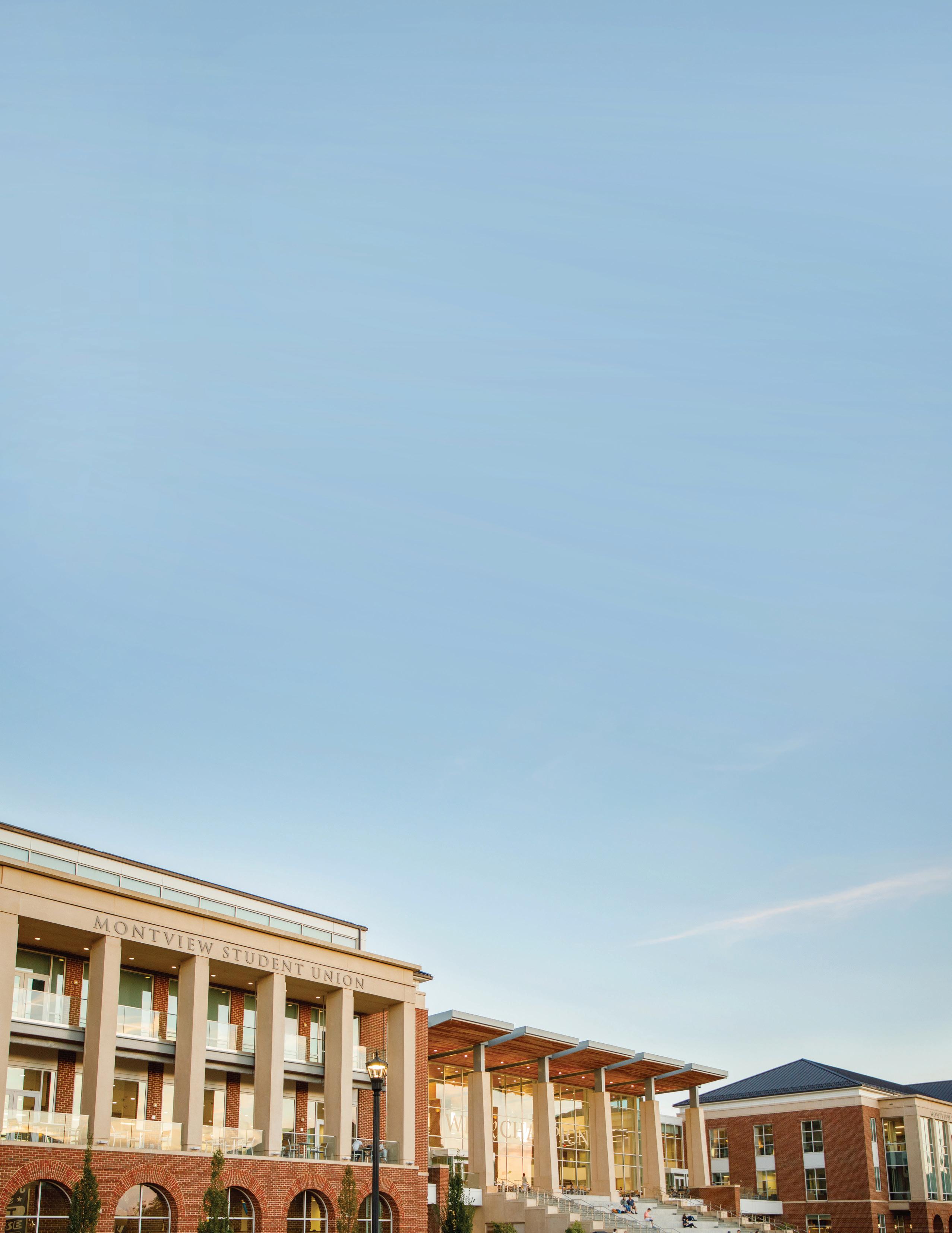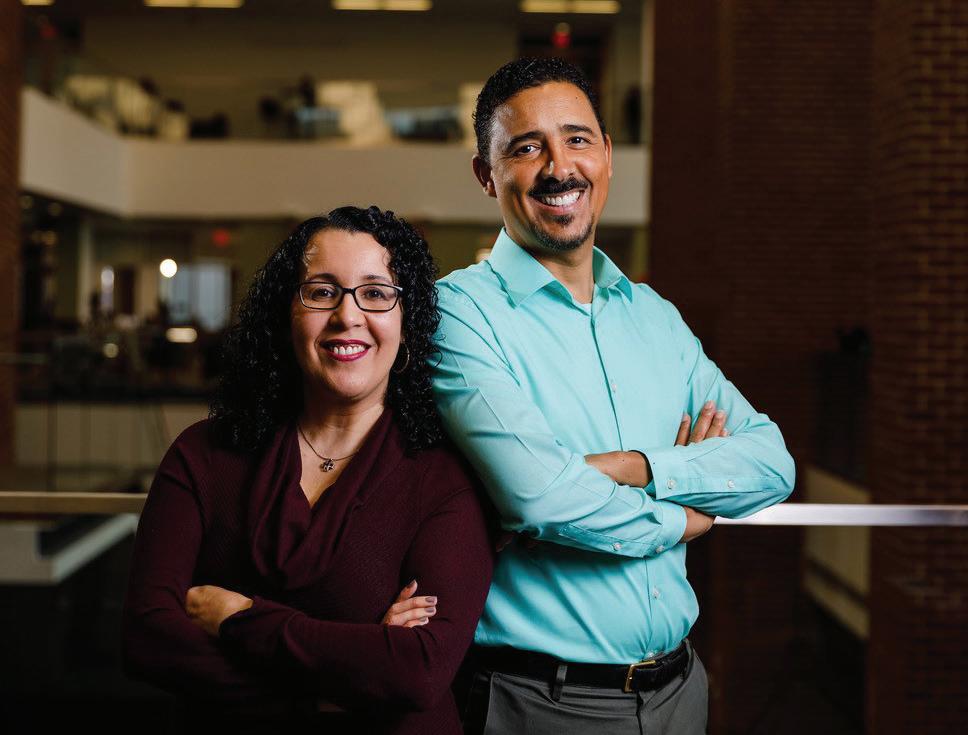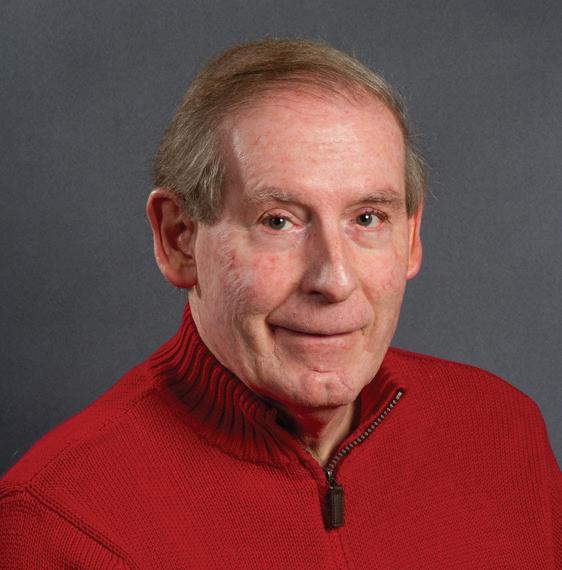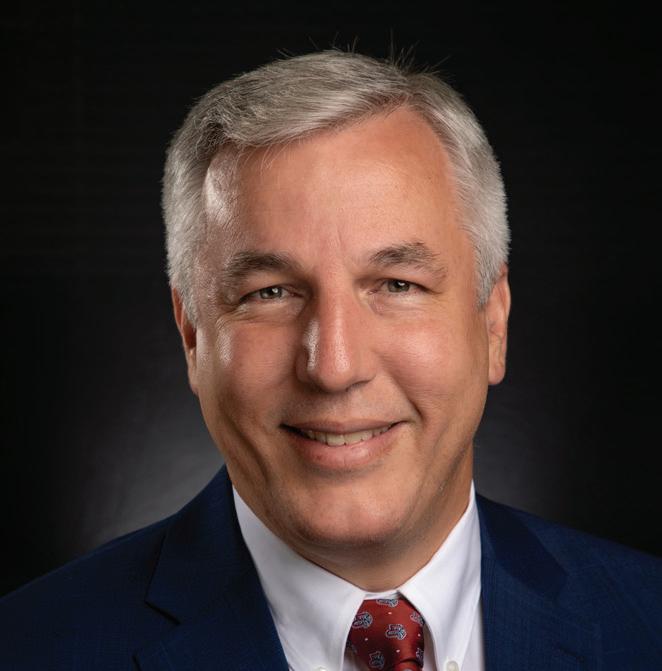
9 minute read
Alumni Notes
MARY JO OLIVER BACHELOR OF SCIENCE IN PSYCHOLOGY, CLASS OF 2019
My journey through Liberty’s psychology department began after my transfer from a community college. Initially focused on navigating my future career goals, my trajectory changed suddenly after attending a prerequisite class in behavioral science research. As I learned the significance of research and its impact on psychology, my interest in the field began to grow. My time at Liberty in both undergraduate and graduate school reflects my desire to understand God’s creation through psychological research.

My research experience at an undergraduate level continued after my advising professor encouraged me to apply for the Daniel’s Program. The undergraduate research team focused on the conceptual understanding of compassionate love and empathy and the predictors of forgiveness. Under the phenomenal Dr. Kim and my fellow peers, the group’s hard work and passion for the project remained evident throughout the IRB approval process, data analysis, and journal authorship. In the end, our group presented at one national and three regional conferences and received publication in the Journal of Psychology and Theology. After this, I definitively oriented my scholastic and vocational goals toward studying and producing high-quality research for practitioners from this experience. After finishing my undergraduate degree in 2019, I enrolled in the master’s program focusing on developmental psychology and am currently writing my thesis on applied forgiveness intervention. My relationship with the psychology department continues in my current position as a graduate teaching assistant for Dr. Kelly. I count it a unique privilege and blessing to teach new students about the significance of research. Currently, my plans for postgraduate work include pursuing a Ph.D. in the field of community health psychology. Throughout my undergraduate and graduate experiences, I discovered the necessity for quality research that evaluates and understands the needs of at-risk populations. My passion for psychological research has only grown from my first class at Liberty, and I plan to use the skills I have obtained from Liberty to bring people closer to Christ. I hope that my life will reflect a desire to see the Gospel spread throughout academia as a professor or researcher.
CONSTANCE SCHNEIDER, STUDENT BODY PRESIDENT PSYCHOLOGY MAJOR, CLASS OF 2021

Q: Why did you pick psychology as your major?
A: I was initially interested in studying psychology because human behavior fascinated me. The ability to understand and interact with others is a skill that proves useful in a variety of workplaces. As I made the transition into college, I wanted to study something that could equip me and provide a solid foundation for the career path that I chose. Liberty had specific programs (such as industrial/organizational psychology) that not only studied human behavior but also applied a Christian worldview in the classroom.

Q: What is the most important thing you have learned or discovered from your psychology classes at Liberty?
A: Just as people have mental processes, they also have spiritual processes, and Liberty has taught me how they complement more often than contradict each other. I have learned how to view people holistically — as individuals with inherent value and spiritual significance. This type of mindset influences how I work and interact with others, especially within my role as president of the student body.
Q: What are your aspirations and hopes as student body president?
A: Our goal in the Student Government Association (SGA) is to truly represent students in all that we say and do. We have many projects and initiatives already underway for the year, most of which involve strengthening our relationships with other university departments and expanding our reach within the student body. Our intention is to not simply have a “one-year plan” but rather to make lasting change within the structure of both SGA and the way we interact with other departments and individuals in the university. One specific goal I’m excited about surrounds the idea of mentorship. We’re encouraging our Executive Cabinet members to reach out and mentor a younger student. We also hope to come alongside a few other departments in creating a mentorship program between students and professionals in their field, notably Liberty alumni.
Q: What are your plans post-graduation?
A: I plan on attending law school after I graduate in May 2021. My background in psychology has offered me a different perspective when it comes to practicing law, and I’m especially grateful to have a Christian worldview as I enter this new career field. My end goal is to become an attorney that handles domestic abuse/sexual assault cases. In my eyes, compassionate and competent lawyers are needed in fields where clients might have experienced serious trauma and abuse.
Q: What advice would you give to first-year psychology students?
A: My advice would be to really understand why you want to pursue psychology. The motive of an action or a decision in life can be more important than the action or decision itself. The second question I would suggest asking yourself would be, “How can society benefit from your pursuit of this degree?” Use what you are learning to really explore and increase your self-understanding. Be a sponge and soak in all the wisdom of your psychological studies!
FACULTY BOOK RELEASE


The Dream Home: How to Create an Intimate Christian Marriage
ELIAS MOITINHO, PROFESSOR DENISE MOITINHO, ASSISTANT PROFESSOR
Q: Why did you write the book?
A: We wrote The Dream Home book because we love marriage and family counseling and ministry. For many years, we have helped couples grow closer in their intimacy and strengthen their marriages. We have accomplished this task through pastoral counseling and marriage counseling, marriage conferences, marriage classes, marriage workshops, and church-based couples’ mentorship. It is our desire to help couples achieve the intimacy God designed for marriage so they can honor Him through their marriage. We want to provide couples with the knowledge and skills they need to help them make the phrase “and they lived happily ever after” part of their story as they build their dream home.
Q: Who is the book for?
A: The book is for couples who want to continue to improve their marriage and intimacy. It is also for couples who are struggling in their marriage and want practical help to improve their relationship. We believe that engaged couples can benefit from the book as well. Our book is also available in Spanish with the title, El Hogar de Tus Sueños: Cómo Crear un Matrimonio Cristiano Íntimo.
We strongly believe that this book can contribute to church ministry in distinctive ways. It can be used as: › a marriage enrichment book for couples › a study book for small groups or classes at church › a marriage enrichment curriculum for retreats or marriage conferences › a textbook for a marriage and family class or a pastoral counseling class a curriculum for marriage preparation or premarital class/ workshop
Q: What is the book about?
A: The Dream Home uses the metaphor of a home to describe the various areas of marriage in a creative way. We start our journey to create a dream home by going house hunting, and in this process, we discuss how to create a shared vision for marriage. We discuss the concept of location in relationship to self, spouse, and God. We also discuss the “curb appeal” as a picture for the couple’s testimony or reputation in their family and community. Then, we enter the house and check out each room carefully by using metaphors. Each room represents an aspect of the relationship, such as communication, dealing with conflict, and managing finances. For instance, the master bedroom represents multidimensional intimacy. An important concept is that each room of the home influences the master bedroom — in other words, every area of the relationship influences marital intimacy. By using metaphors and analogies, we make essential concepts about Christian marriage and relationship skills easier for couples to understand. We also include flow charts and graphs to help readers grasp some new concepts and visualize how these concepts relate to their lives. The Dream Home book provides solid biblical principles combined with research and professional and ministry experience. It is about giving married couples, and those planning to get married, not only hope and encouragement but also essential knowledge and relationship skills to help them create a dream home, which represents an intimate Christian marriage. The book includes access to eight videos we recorded to provided motivation and an overview of some concepts in the book. Visit MotivationAndGrowth.com to purchase a copy and learn more.
FAREWELL & THANK YOU


Dr. William Scott
Dr. William Scott retired in the spring of 2020. He has been with the university for 26 years, teaching courses such as Crisis Intervention, Group Dynamics, Psychology of Personality, and Abnormal Psychology in the Psychology Department. Dr. Scott is a Certified Professional Counselor and holds several clinical memberships for both the American and Virginia Association of Marriage and Family Therapies. At Liberty and abroad, Dr. Scott constantly demonstrated his heart for the students and enjoyed teaching. His experiences and observations throughout his life added valuable insight and understanding to the academic experience at Liberty University. He will be greatly missed.

Keaghlan Macon
Keaghlan Macon has served as one of the Psychology Department’s Faculty Support Coordinators since 2018 and will be transitioning to a new position to continue her residency as a counselor at Student Counseling Services here at Liberty University. Through her work as a faculty support coordinator, many faculty and students have benefited from her exceptional attention to detail, organizational knowledge, and congenial attitude. During her time serving in the Psychology Department, she has contributed to the field with many presentations, publications, awards, research grants, and leadership positions. We are thankful for the time she shared with us, and we are happy to see her advance in her field of study. She will be dearly missed.
The DEPARTMENTS of COUNSELING train individuals to be thoroughly competent professionals in the practice of agency, community, education, family, and pastoral counseling, supported by a Christian worldview.
For more information:
Department of Counselor Education & Family Studies Department of Community Care & Counseling Counseling@liberty.edu | (434) 592-4049 DCCC@liberty.edu | (434) 592-4049
The DEPARTMENT of PSYCHOLOGY provides students with the knowledge and skills required for the development of a biblically integrated, evidence-based understanding of human psychology through practical application and research. For more information: Department of Psychology (434) 592-4038 | Psychology@liberty.edu
The DEPARTMENT of SOCIAL WORK develops Christ-centered social workers who are equipped with the skills, values, and knowledge to humbly lead in advancing the well-being of individuals and communities all around the world. For more information: Department of Social Work (434) 582-7570 | LUOSocialWork@liberty.edu
The School of Behavioral Sciences Academic Newsletter is published for all faculty, staff, students, alumni, and friends of Liberty University’s School of Behavioral Sciences, and it is delivered through email and published online.
We want to hear from you! Please let us know about the good work that you are doing in behavioral sciences and in the world as Liberty University community members, graduates, professionals, and friends! Interested in contributing to the next issue of the newsletter? We welcome any relevant news, press releases, publications, or potential feature articles from faculty, students, or alumni.
For more information, please contact
the General Editor at kalieditor@liberty.edu.




